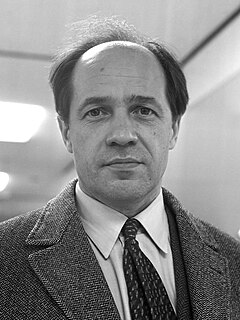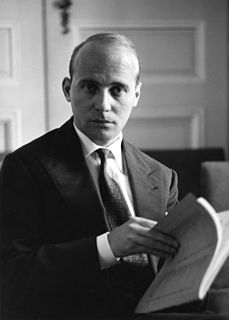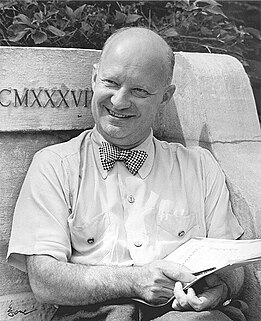
Pli selon pli is a piece of classical music by the French composer Pierre Boulez. It carries the subtitle Portrait de Mallarmé. It is scored for a solo soprano and orchestra and uses the texts of three sonnets of French symbolist poet Stéphane Mallarmé and single lines from two of his other poems. At over an hour, it is Boulez's longest work.
Ivan the Terrible, Op. 116, is the score composed by Sergei Prokofiev for Sergei Eisenstein's film Ivan the Terrible (1942–45) and its sequel (1946), the first two parts of an incomplete trilogy. The project was Prokofiev's second collaboration with Eisenstein, the first being the popular Aleksandr Nevskiy (1938). The majority of the non-liturgical song texts were written by Vladimir Lugovskoy, who collaborated with Prokofiev on the texts for Aleksandr Nevskiy.
Andrew Lloyd Webber's Requiem is a requiem mass, which premiered in 1985. It was written in memory of the composer's father, William Lloyd Webber, who died in 1982.

König Hirsch is an opera in three acts by Hans Werner Henze to a German libretto by Heinz von Cramer after Il re cervo, a theatrical fable (1762) by Carlo Gozzi. He revised it as Il re cervo, premiered in 1963 at the Staatstheater Kassel.

Witold Lutosławski wrote his Symphony No. 3 in 1973–1983. The Chicago Symphony Orchestra, conducted by Georg Solti, gave the world premiere on 29 September 1983. The work is dedicated to Solti and the Chicago Symphony Orchestra. It was awarded the Nagroda Solidarności in 1984 and selected for the first Grawemeyer Award for Music Composition in 1985.

Stuart Saunders Smith is an American composer and percussionist. After having studied composition and music theory at three music institutions, Smith is currently based in Vermont, United States, with his wife Sylvia. He has produced almost 200 compositions, half of which were written for percussion instruments with a focus on the vibraphone.
The Wooden Prince, Op. 13, Sz. 60, is a one-act pantomime ballet composed by Béla Bartók in 1914–1916 to a scenario by Béla Balázs. It was first performed at the Budapest Opera on 12 May 1917 under the conductor Egisto Tango.

Der Mond is an opera in one act by Carl Orff based on a Grimm's fairy tale with a libretto by the composer. It was first performed on 5 February 1939 by the Bavarian State Opera in Munich under the direction of Clemens Krauss. The composer describes it not as an opera but as Ein kleines Welttheater ; the performance lasts for about one hour and is often paired with Orff's Die Kluge.

When Lilacs Last in the Dooryard Bloom'd: A Requiem for those we love is a 1946 oratorio by composer Paul Hindemith, based on the poem of the same name by Walt Whitman. Conductor Robert Shaw and the Robert Shaw Chorale commissioned the work after the 1945 death of President Franklin D. Roosevelt. It received its world premiere on May 14, 1946, at New York City Center, with the Collegiate Chorale conducted by Shaw and soloists Mona Paulee, contralto, and George Burnson, baritone. Paulee performed the work again with bass-baritone Chester Watson and the CBS Symphony Orchestra for the work's first recorded broadcast on CBS Radio on June 30, 1946.

L-R-G / The Maze / S II Examples is an album by American jazz saxophonist Roscoe Mitchell recorded in 1978 and released originally as a double LP on Nessa Records. It was reissued in 1989 as a single CD.
The Percussion Concerto No. 2 is a concerto for solo percussion and orchestra by the Scottish composer James MacMillan. The work was jointly commissioned by the Netherlands Radio Philharmonic, the Philharmonia Orchestra, the Orchestre national du Capitole de Toulouse, the Cabrillo Festival of Contemporary Music, the Baltimore Symphony Orchestra, and the São Paulo State Symphony. It was first performed on November 7, 2014 at TivoliVredenburg in Utrecht, the Netherlands, by percussionist Colin Currie and the Netherlands Radio Philharmonic under conductor James Gaffigan. The composition is MacMillan's second percussion concerto after 1992's Veni, Veni, Emmanuel.
The Symphony No. 3 is the third symphony by the Scottish composer James MacMillan. The piece was first performed on April 17, 2003 in NHK Hall, Tokyo, by the NHK Symphony Orchestra under the conductor Charles Dutoit.

The Triumph of Time, sometimes also referred to as Triumph of Time, is a composition for orchestra by British composer Harrison Birtwistle written 1971 and 1972. It is one of Birtwistle's best-known compositions, as well as one of the works that earned him international reputation.

Die Harmonie der Welt Symphony, IPH 50, is a symphony by German composer Paul Hindemith composed in 1951, which served as the basis for his opera Die Harmonie der Welt.

The Triple Concerto No. 2, Op. 139, is a concerto for three instruments – violin, harp and double bass – and orchestra by Dmitri Smirnov, composed in 2003. It was premiered in the centenary concert of the London Symphony Orchestra on 26 May 2004, with principal players from the orchestra as soloists.

Arcana is a symphonic poem for large orchestra by French composer Edgard Varèse. It was composed between 1925 and 1927, with a later revision in 1931–32.









